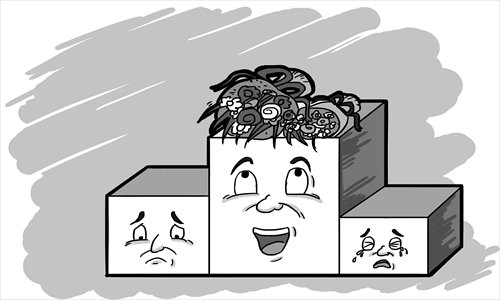Historical weakness creates China's gold medal fixation

Editor's Note:
Chinese media outlets have already started putting the medal table in a prominent place on their front pages. With the nation still glowing from topping the table in 2008, and the media flocking to cover champions while ignoring runners-up, is the obsession with gold medals bad for national character? Has the fervor around gold medals really faded since 2008? The Global Times invited two commentators to give their views.
The Chinese media has naturally been focusing on the first gold medal winners at the London Olympic Games, where China currently tops the medal table, while the bronze and even silver champions have been largely ignored.
This has caused some controversy online. However, I think it is quite natural.
Sports competitions encourage people to fight for room at the top. The Olympic motto is "Citius, Altius, Fortius," which is Latin for "Faster, Higher, Stronger."
The medals are the embodiment of national honor on the track or in the gym or pool. Although winning is gratifying and defeat can even be a relief, we all want to do better.
We might end up with nothing, but we cannot go in expecting that. Participation is very important, and meanwhile, the pursuit of victory is inherent in human nature.
There are historical reasons why China attaches great importance to gold medals.
China was known as "the sick man of Asia," torn by war and poverty. Liu Changchun, who was the first Chinese to participate in the Olympic Games in 1932, was sponsored by the warlord Chang Hsueh-liang as the first representative of war-torn China.
Liu arrived only three days before the opening ceremony, after a nearly month-long journey from Shanghai to Los Angeles. Finally, he was eliminated in the preliminary round.
China didn't win its first Olympic medal until 1984. It is understandable that China puts such weight on gold medals.
Some link showing great attention to champions to social inequality. I don't agree.
Each medal is very valuable. The media hasn't deliberately ignored bronze medalist. Not being engulfed by jostling media cannot be equated with a lack of respect. We cannot overinterpret this phenomenon.
There are people who blame institutional problems for China's gold medal obsession.
They argue that the existing system purely pushes athletes to get the gold medals and the public should never worry about gold medals that much.
There are certainly problems here. But that's no excuse for giving up the pursuit of the top.
It's unacceptable to take the attitude that winning is everything, and to try anything from doping to fielding underage athletes to get it.
Nevertheless, it is ridiculous to give up gold medals for this reason.
During the Cultural Revolution (1966-76), China deliberately lost games or conceded points to other countries in international competitions as part of a diplomatic sports policy of "friendship first, competition second."
This approach actually showed no respect for athletes from other countries. It was a perverted notion of sportsmanship.
The Olympic Games has many functions. It is a sports arena, a celebration of the Olympic spirit, and a platform for the realization of national honor. The mainstream value of honoring our country will not change.
This indomitable Olympic spirit of self-improvement has been encouraging Chinese people to work hard for their dream and their country generation after generation.
The article was compiled by Global Times reporter Shu Meng based on an interview with Zhang Yiwu, professor and deputy director of the Cultural Resources Research Center of Peking University. shumeng@globaltimes.com.cn
Public preferences drive winner-takes-all mentality